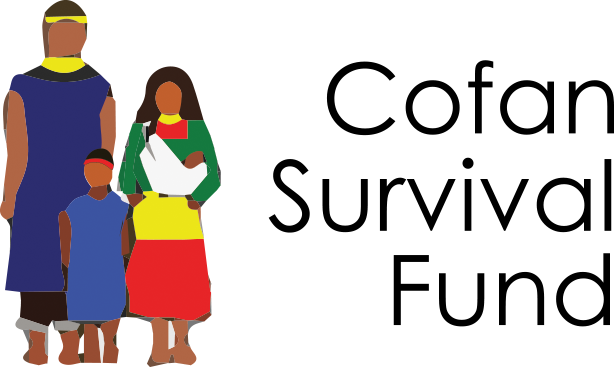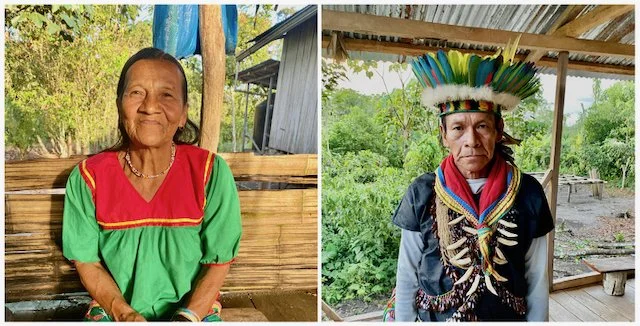Dear Cofan Survival Fund Supporters,
Hello from—cold, hot?—San Antonio, Texas. Yesterday started off at 34 degrees but made it to 75 in the afternoon. The climate of Cofan territory is extreme, too, but 40-degree single-day shifts don’t happen there. Reportedly, Texas will return to the 20’s tomorrow, so I’ll definitely be dreaming of the Amazon.
Many of you likely have seen news of the ongoing political violence in Ecuador. In short, criminal gangs allied with Mexican cartels are battling for control of the country’s Pacific ports, from which they ship cocaine grown and processed in Colombia. Ecuador’s new president has declared an “internal war” against the gangs. The situation has calmed over the last week, but it’s a very uncertain time for Ecuador. Luckily, none of the turmoil has reached Cofan territory. But if the country slips into the instability that has plagued Colombia and Mexico, it will bring a whole new set of challenges to the Cofan. After all, the narco economy is closely tied to the mining economy, and mining is one of the main threats facing the Cofan and their land.
We have good news and bad news. First, the good. With the generous support of your donations and grants from the Azimuth Fund and the Houser Foundation, our Project Manager Felipe Borman has doubled his efforts to protect the Cofán-Bermejo Ecological Reserve from gold miners. The Cofan Park Guard Program has returned to a level of activity it hasn’t seen for years. My long-term goal as CSF President has always been to extend the program to the entirety of Cofan territory.
Our Executive Director, Randy Borman, has well-set plans to move the guards into the Río Cofanes Territory as well as the community of Zábalo’s norther border area, both of which are experiencing illegal incursions. Now, all we need is Felipe’s continued direction and additional financial resources to purchase equipment and supplies, move Cofan guards over long distances, and compensate them for their risky work, which keeps them away from their families for months at a time.
Despite the good news about the Park Guard Program, the Cofan Nation continues to struggle with medical issues despite the important contributions made by our Seguro Campesino Project, which is largely supported by the All Peoples Unitarian Universalist Congregation of Louisville, Kentucky. (Thank you SO MUCH, All Peoples!) Seguro Campesino has already saved Cofan lives; it has also allowed Cofan people to see and walk again.
Today, Octavio Lucitante, a close friend in the community of Duvuno, called and told me he was diagnosed with stomach cancer this morning. Luckily, a CSF team went to his village last year and signed his family up for Seguro Campesino. The service will save him tens of thousands of dollars—which he doesn't have—and hopefully his life.
Seguro Campesino and supplementary health insurance have also saved Randy, who has earned the nickname “Lazarus." He has finally recovered from the health problems of the last two years: a heart attack, skin cancer, and urinary-tract and kidney infections that went septic. Without your donations, Randy and the rest of our CSF team in Ecuador would have no wages and no safety net to deal with medical emergencies.
Beyond the Seguro Campesino Project, our Ecuadorian team helps keep Cofan people alive and well in other ways. Not every Cofan person is signed up for Seguro Campesino; we have yet to bring the project to all communities for lack of resources, and some Cofan individuals are hesitant to sign up because of bureaucratic hurdles. For example, signing up sometimes means temporary lapses in small-but-important welfare payments mothers and elders already receive. We are trying to remedy the issue.
With personal funds, I and other members of the CSF team have worked hard to fill the gaps. The money is important, but the logistical skills of CSF staff in Ecuador make the real difference. I recently offered to pay for an elder’s cataract-removal surgery, which typically costs $3,000. But CSF’s trusty legal expert, Freddy Espinosa, was able to locate a high-quality medical-care facility in Quito that offered a “free week” of the surgery.
Freddy got the elder an appointment, I paid for his tests and travels, and Freddy paid for his food and arranged his lodging at CSF headquarters in Quito. Now, the elder is cataract-free in one eye. In a few months, he’ll get the same operation for his other eye. He’s overjoyed with the results and grateful for CSF support. When his operations are done, I’ve promised to arrange the same surgery for another elder.
All too often, however, things don’t work out as we wish they would. You might be wondering who the two beautiful elders are in the photo at the top of this newsletter. Their names are Elena Criollo and José Queta. They once lived in the Río Cofanes Territory, where they worked closely with the CSF to protect the area from miners. When our resources for their work dwindled, we could no longer compensate them. They returned to their home community and a life of fishing, hunting, gardening, gathering, and doing anything they could to make the small amount of money they needed.
Yesterday afternoon, Elena and José drowned while panning for gold in the headwaters of the Aguarico River. The river rose unexpectedly and their small canoe capsized. In the community of Sinangoe, Cofan people saw their bodies pass in the turbulent waters, but they were unable to retrieve them. The search for their remains is ongoing.
Unlike other miners, Cofan people use a handmade wooden tray, an iron rod, and manual labor to find small amounts of gold. There’s no machinery, no mercury, and no cyanide. It’s one of the most environmentally friendly “jobs” available to the Cofan. But it’s also dangerous. We have long been interested in promoting safe, sustainable, artisanal mining techniques for Cofan communities. Unfortunately, Elena and José passed away before we could create a way for them to earn the income they needed without putting their lives in jeopardy.
The CSF is a one-stop-shop for Cofan welfare. If we had the resources to implement all our projects, no Cofan person would be exposed to such dangers. No rivers would be despoiled by toxic mining. No communities would have to negotiate political turmoil without formally educated, Spanish-speaking leaders. No family would have to maneuver through a byzantine medical bureaucracy without adequate support. And the Cofan Nation could rest assured that their rainforest homeland would be protected far into the future—and that they would find ways to access the income they need without putting their bodies, rivers, and forests at risk.
There is much more to say, but it’s simply too urgent and emotional a time. All of us are grieving the loss of Elena and José, and we’re afraid for the health of Octavio. As soon as I send off this newsletter, I’ll turn to working with our CSF team in Quito to make sure Octavio gets the care he needs to survive his impending battle with cancer.
If you’d like to discuss any of our work or the challenges the Cofan Nation faces, feel free to write me directly at michael.cepek@utsa.edu so we can schedule a conversation. I’d be happy to speak to you about our project needs in our three core areas: land protection, healthcare, and education. I want to remind you that our U.S.-based team is all-volunteer. None of us receive a paycheck; rather, we donate our own money, as well as our time and energy, so CSF staff in Ecuador can make use of all your donations to get their work done. If you want to fight for the welfare of Indigenous Amazonian Peoples and the most biologically diverse, carbon-rich forests in the world, giving to the CSF is a great way to do it.
Sincerely,
Michael L. Cepek, CSF President
CSF is a 501(c)(3) non-profit organization, and donations are tax deductible to the fullest extent allowed by law. For gifts of $250 and larger, you will receive a receipt for tax purposes.

